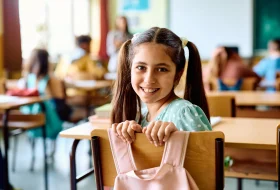The Future School
A Paradigm Shift in Education
Are We Preparing Students for Tomorrow’s World?
The rapid pace of technological and social change demands a fundamental rethinking of how we educate. The journey from a traditional, industrial-age model to a future-focused learning ecosystem is the most critical transformation of our time.
Traditional School
Content Focus: Rote Learning
Teacher Role: Information Dispenser
Curriculum: Subject Silos
Assessment: Standardized Tests
Environment: Fixed Classrooms
Future School
Content Focus: Skill Development
Teacher Role: Facilitator & Mentor
Curriculum: Interdisciplinary Projects
Assessment: Authentic Portfolios
Environment: Flexible Learning Spaces
Pillars of Future Education
The future school is built on a foundation of six interconnected pillars, each designed to empower students and create a holistic, adaptive, and engaging learning experience.
Student-Centered Learning
Shifting focus to personalized pathways, inquiry-based learning, and student ownership of their educational journey.
Integrated Technology
Leveraging AI, VR/AR, and global collaboration tools to create immersive and adaptive learning experiences.
Interdisciplinary Curriculum
Breaking down subject silos to solve real-world problems through project-based, cross-curricular learning.
Holistic Development
Fostering social-emotional learning (SEL), resilience, empathy, and critical thinking as core competencies.
Flexible Environments
Designing adaptable physical and virtual spaces that support collaboration, exploration, and diverse learning styles.
Community Engagement
Building strong partnerships with parents, experts, and local organizations to create a rich learning ecosystem.
Outcomes of a Future-Ready Education
The goal is not just to impart knowledge, but to cultivate a versatile skill set that prepares students to thrive in a complex and unpredictable future. The modern learner is a well-rounded thinker, creator, and collaborator.
This radar chart visualizes the balanced development of a future-ready learner. Unlike specialized learning, the future school model aims to develop high proficiency across a range of essential cognitive, social, and emotional skills, creating adaptable and resilient individuals.
